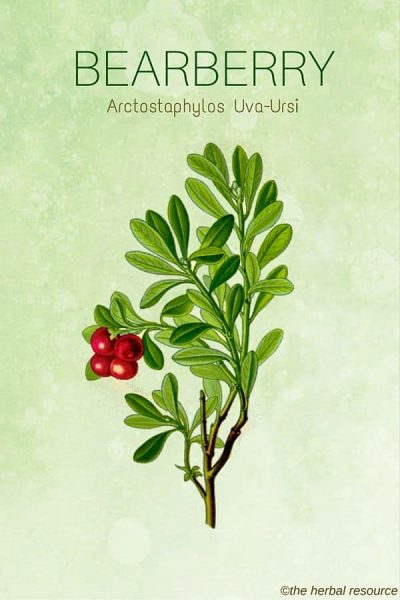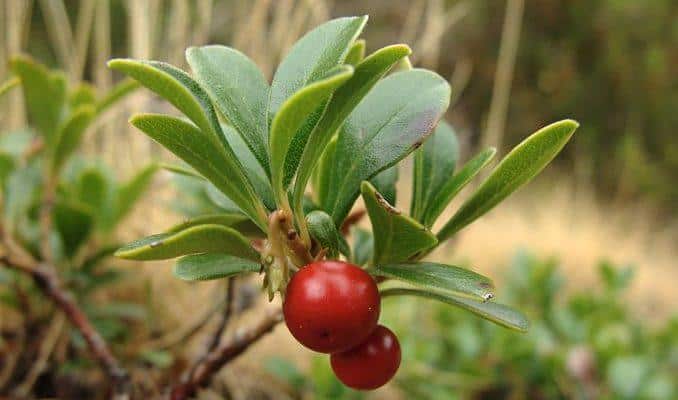Botanical Name: Arctostaphylos Uva-Ursi.
Other Common Names
- Uva ursi
- Hogberry
- Manzanita
- Kinnikinnik
- Rockberry
- Beargrape.
Habitat
Bearberry is well suited to sub-Arctic zones and may be found at those latitudes worldwide.
It is particularly common in Central and Northern Europe, but may also be found growing in the wild in North America as well as isolated instances in more southerly regions at high elevations.
Description
Uva ursi is any one of a variety of low-profile bushes that grow to the height of around 20 cm. The plant has a thick bark and leathery oval leaves that are about 1.5 cm in length. The bark is usually covered in fine, silky hairs.
The flowers are either pink or white and have five distinct petals, each one less than a cm in length. It grows a red fruit that is often confused with a relative, the American cranberry.
Plant Parts Used
Leaves and stems, flowers in season.
Therapeutic Uses, Benefits and Claims of Bearberry
Bearberry purportedly gets its name from the fact that the berries seem to be a favorite food of bears.
Uva ursi acts as a natural diuretic. It has been used historically to treat cystitis, urolithiasis, and other urinary tract infections. (1)
It is a traditional bladder treatment used in European folk medicine. In northern Europe and Eurasia, bearberry tea has been a traditional herbal treatment for hundreds of years. (2)
Some Native American tribes used an infusion of the stems of bearberry and blueberry as a way to prevent miscarriage, and aid a woman’s recovery after childbirth. (3)
The leaves of uva ursi contain a very powerful and recognized antibacterial chemical compound known as hydroquinones. This is a scientifically proven compound, but its use is questioned by the US Food and Drug Administration, and the plant is not sanctioned for medical use in the United States. (4)
A tea made from a decoction of dried bearberry leaves is a traditional treatment for urinary tract infections in many parts of the world.
Ingesting bearberry tea works best if the patient is on a vegetable-based diet. It has been clinically shown to be more effective when the urine is alkaline in nature. (2)
The uva ursi leaves may be smoked to relieve a headache. This form of use is illegal or carefully regulated in many regions, due to the narcotic effect of the plant.
A partially dehydrated decoction made from bearberry may be applied as a salve to canker sores, sore gums, burns, and minor cuts. (3)
The folk remedies of many cultures suggest bearberry as an effective treatment for backache, rheumatism, and arthritis. (5)
It is used as a disinfectant in some regions, perhaps due to its known attributes as a urinary antiseptic.

Dosage and Administration
Commonly an infusion is made by soaking the leaves in hot oil or a tincture in an ethanol solution.
Internal treatments should be kept to a maximum of 2-3 doses per day, and reduced or discontinued if adverse symptoms occur.
Poultices and ointments may be applied as necessary, generally several times a day. (2)
Potential Side Effects of Bearberry (Uva Ursi)
One of the active ingredients in bearberry is a chemical known as hydroquinone. It is a toxic chemical and should be taken with care.
Short-term side effects may include mild nausea or dizziness. Long-term use is not recommended without the supervision of a physician or a trained herbal practitioner. (3)
Supporting References
- Gohari, A. R., & Saeidnia, S. (2014). The role of herbal medicines in treatment of urinary tract diseases. Journal of nephropharmacology, 3(1), 13–14.
- Assessment report on Arctostaphylos uva-ursi (L.) Spreng., folium. European Medicines Agency. Committee on Herbal Medicinal Products (HMPC). 28 March 2017 EMA/HMPC/750266/2016.
- Herbal Medicine: Expanded Commission E. Uva Ursi leaf. American Botanical Council.
- Arriba, Susana & Naser, Belal & Nolte, Klaus-Ulrich. (2013). Risk Assessment of Free Hydroquinone Derived from Arctostaphylos Uva-ursi folium Herbal Preparations. International journal of toxicology. 32. 442-53. 10.1177/1091581813507721.
- MATSUDA, Hideaki & Tanaka, Tomoaki & KUBO, Michinori. (1991). Pharmacological Studies on Leaf of Arctostaphylos uva-ursi (L.) SPRENG. III. Combined Effect of Arbutin and Indomethacin on Immuno-infiammation. Yakugaku zasshi : Journal of the Pharmaceutical Society of Japan. 111. 253-8. 10.1248/yakushi1947.111.4-5_253.
Thordur Sturluson
Latest posts by Thordur Sturluson (see all)
- What is the Difference Between Hemp and Marijuana? - June 3, 2019

Leave a Reply